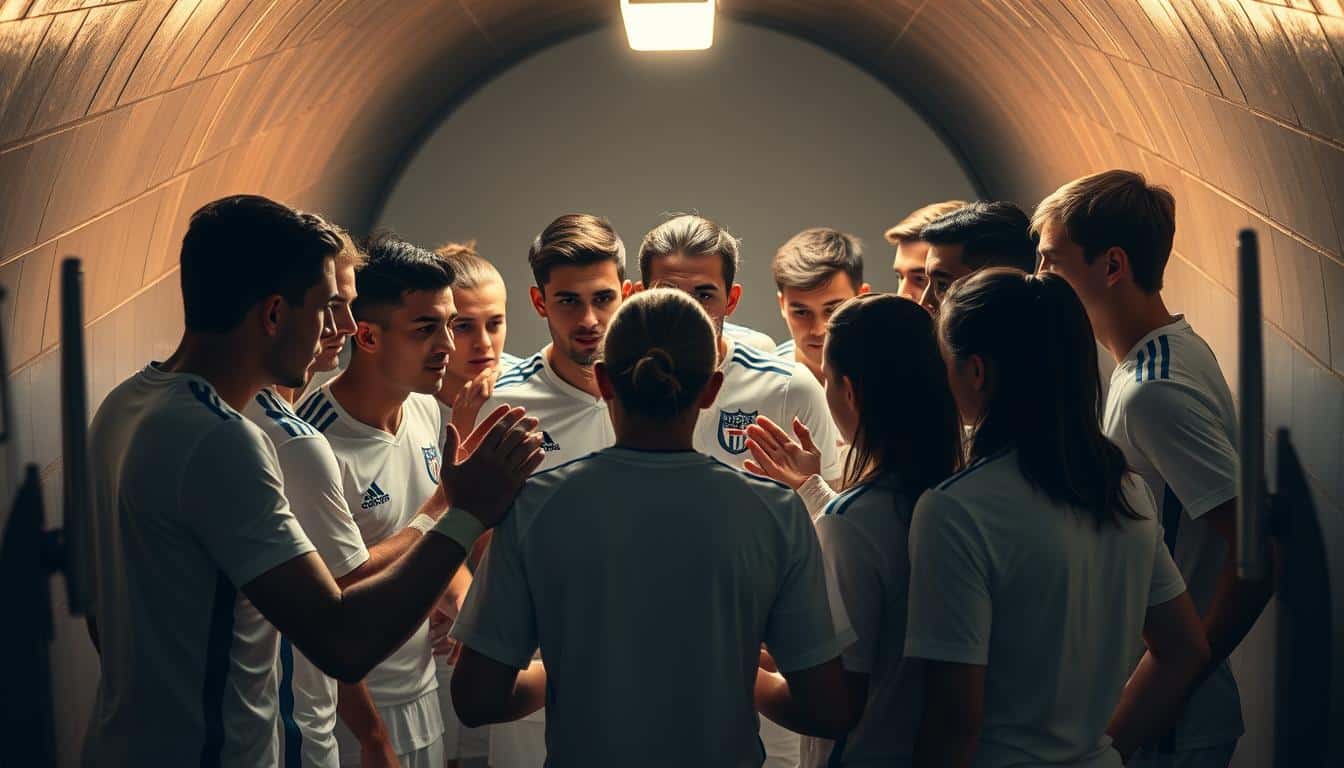Pre-Game Rituals for Soccer Teams

What separates good athletes from unstoppable ones? Often, it’s not just skill – it’s the mental edge they create through intentional habits. Players across the sport rely on personalized routines to sharpen focus, build confidence, and enter games ready to dominate.
These practices aren’t random superstitions. Top performers use science-backed methods to trigger peak performance states. From synchronized warm-ups to mindfulness exercises, structured rituals help athletes block distractions and access their training when it matters most.
You’ll see how simple actions – like visualizing success or repeating a motivational phrase – create powerful psychological effects. But there’s a catch: effective routines balance consistency with adaptability. We’ll show you how to avoid rigid habits that backfire under pressure.
Key Takeaways
- Pre-game habits boost focus and confidence through repetition
- Successful athletes use personalized routines, not random superstitions
- Visualization and breathing exercises improve mental readiness
- Effective rituals adapt to changing game conditions
- Balance consistency with flexibility for best results
- Team-wide routines strengthen coordination and trust
The Value of a Pre-Game Ritual
Ever wonder how top performers consistently deliver their best? The difference often lies in their preparation. Mental Performance Coach Drew Morgan explains: “High performance starts with knowing what works for you, then building a routine to get there.” This intentional approach creates mental clarity that translates to physical results.
Boosting Your Team’s Confidence
Familiar patterns act like mental shortcuts. When players repeat actions linked to past success, they trigger positive memories. This builds belief in their abilities. Think of it as muscle memory for the mind – proven methods help athletes feel in control before stepping onto the field.
| Routine Element | Mental Benefit | Physical Impact |
|---|---|---|
| Visualization | Reduces anxiety | Improves reaction time |
| Breathing exercises | Sharpens focus | Lowers heart rate |
| Positive affirmations | Builds self-trust | Enhances coordination |
Enhancing Focus and Readiness
Effective preparation creates a clear shift from normal life to game mode. When everyone follows their personalized practice, it eliminates distractions. This isn’t about superstition – it’s about creating reliable triggers that tell your body and brain: “It’s time to perform.”
The best way to build these habits? Start small. Choose one action that helps you feel centered. Repeat it consistently, but stay flexible enough to adapt when conditions change. That balance turns random actions into powerful performance tools.
Soccer team pre-game rituals
Legendary athletes often have quirky habits that become part of their success story. Let’s explore how famous players turned personal traditions into performance boosters.
Iconic Examples from Football Greats
Wayne Rooney devoured a bowl of sugary cereal before every game, ignoring nutrition norms. John Terry relied on decade-old shin guards – not for safety, but as a good luck charm. These choices weren’t random. They created familiar patterns that signaled “game mode” to their brains.
Gary Lineker’s warm-up strategy shows intentional restraint. He avoided scoring in practice to conserve mental energy. Johan Cruyff took this further – his pre-match gum spit into rival territory became a psychological power move.
Why Odd Habits Work
These actions seem strange but serve critical functions:
- Repeated behaviors build muscle memory for the mind
- Familiar objects (like Terry’s shin pads) create comfort
- Unique actions (Cruyff’s gum ritual) establish mental boundaries
Neymar Jr’s pre-game calls to his father blend family support with spiritual focus. This dual approach helps players access both emotional stability and competitive fire. The key isn’t what they do – it’s how these actions anchor their mindset.
Effective Ritual Strategies for Every Match
The secret to consistent performance lies in small, repeatable actions. These strategies help players control their energy and attention, whether they’re stepping onto the pitch for local games or championship matches.
Simple Actions with Big Impact
Start with what works immediately. A 5-minute dynamic stretching sequence can signal “game time” better than complex drills. Pair physical warm-ups with mental triggers – like reciting a personal mantra while tying cleats.
| Energy Level | Activation Strategy | Calming Technique |
|---|---|---|
| Too low | Pump-up music playlists | N/A |
| Optimal | Power poses | Box breathing |
| Too high | N/A | Guided visualization |
Help players identify their ideal arousal state. Some thrive on pre-match hype huddles. Others need quiet visualization of successful plays. Test different approaches during practice to find what sticks.
Balancing Tradition and Innovation
Keep core routines flexible. A player might always listen to the same song – but change how they visualize the field layout based on opponents. Update rituals when:
- Venues change (indoor vs outdoor)
- Weather affects playing conditions
- New team members join
Track what works through quick post-game check-ins. Ask: “Which preparation method helped you most today?” Refine your way of working until routines feel natural yet purposeful.
Dos and Don’ts of Your Game-Day Routine
What happens when preparation becomes pressure? The best routines walk a tightrope between structure and adaptability. Too rigid, and they crumble under stress. Too loose, and they lose their power to focus your mind.
Steering Clear of Superstitious Traps
Rituals turn problematic when they feel mandatory. If missing one step throws off your entire day, you’ve crossed into superstition territory. Players who panic when their lucky socks go missing aren’t focused on performance – they’re distracted by fear.
Watch for these warning signs:
- Changing established patterns before big games
- Blaming outcomes on skipped steps rather than execution
- Needing specific objects to feel ready
Building Adaptable Habits
Effective routines have interchangeable parts. Maybe you always do breathing exercises – but can switch between box breathing and 4-7-8 techniques. This flexibility keeps the core commitment intact while allowing adjustments for late starts or venue changes.
Try this approach:
- Identify 2-3 non-negotiable focus builders (e.g., visualization)
- Create backup actions for common disruptions
- Practice modified versions during training
The goal isn’t doing the same thing every time – it’s entering each match with equal confidence. When your warm-up gets cut short, you’ll know which steps truly matter.
Crafting Your Personalized Pre-Game Plan
Great preparation isn’t about copying others – it’s about designing your roadmap to peak performance. Start by asking: “What mental state helps me perform best?” Your answer becomes the foundation for building habits that work specifically for you.
Identifying What Works Best for You
Track your energy patterns during practice. Do fast-paced drills fire you up? Or does quiet visualization steady your nerves? Use this simple test:
| Player Type | Activation Strategy | Calming Technique |
|---|---|---|
| High-energy | Group chants | Rhythmic breathing |
| Focused | Solo visualization | Progressive muscle relaxation |
Try different combinations for 3-5 matches. Note which methods improve your decision-making and confidence. Update your approach as your skills grow – a rookie’s needs differ from a 10-year veteran’s.
Incorporating Team Involvement
While personalization matters, group cohesion elevates everyone. Blend individual prep with shared actions:
- Start warm-ups together, then split for personal routines
- Create team hand signals for quick mindset resets
- Pair veterans with newer players for ritual brainstorming
Remember: The best plans evolve. Revisit your strategy every season – your career growth demands it. What worked in college might need tweaking in the pro world. Stay curious, stay adaptable, and watch your game reach new heights.
Tactics to Refine and Evolve Your Rituals
Even Premier League legends needed trial and error to perfect their game-day habits. Gary Neville’s locker-room reading sessions and Rio Ferdinand’s explosive water bottle routine didn’t become iconic overnight – they evolved through constant refinement.

Assessing the Effectiveness of Rituals
Track results with these simple methods:
- Rate confidence levels on a 1-10 scale before each match
- Compare passing accuracy or shot success rates after changing routines
- Note how quickly players recover from mistakes during play
Manchester City’s coaching staff uses post-game surveys asking: “Which preparation step helped you most today?” This approach helped identify when Kolo Touré’s tunnel timing became counterproductive during Champions League matches – leading to tactical adjustments.
Try this 3-step evaluation system:
- Test new habits during practice games first
- Measure performance metrics for 5 consecutive matches
- Discuss findings in player-led review sessions
Remember Ferdinand’s sprint to the corner flag? That ritual survived because it boosted his first-touch success rate by 18%. Pair physical prep with safe warm-up strategies to create sustainable routines that withstand tournament pressures.
Update your approach every season. What worked in last year’s Premier League might need tweaking for new opponents. Keep core elements that build confidence, but stay flexible enough to ditch habits that rely on luck rather than proven results.
Final Thoughts on Enhancing Game-Day Energy
Champions understand that game-day energy isn’t accidental – it’s built through smart preparation. Take inspiration from icons like Laurent Blanc, whose unusual pre-match tradition helped France secure their first World Cup victory. Even suspended for the final, he stepped onto the field to repeat his ritual – proof that meaningful habits transcend superstition.
Balance matters most. Gareth Bale’s sock modifications show how small tweaks boost confidence without relying on good luck charms. Johan Cruyff’s legacy teaches us this: Effective rituals adapt to the moment while keeping core intentions intact.
Build your playbook using these principles:
- Prioritize actions that sharpen focus over empty traditions
- Let players personalize warm-ups while maintaining group cohesion
- Update routines as skills evolve – what worked in youth clubs might need refining in the Champions League
Remember – the best performers treat preparation as part of their practice, not magic spells. Whether you’re coaching a local squad or dreaming of the Premier League, create habits that grow with your athletes. That’s how legends are made.
